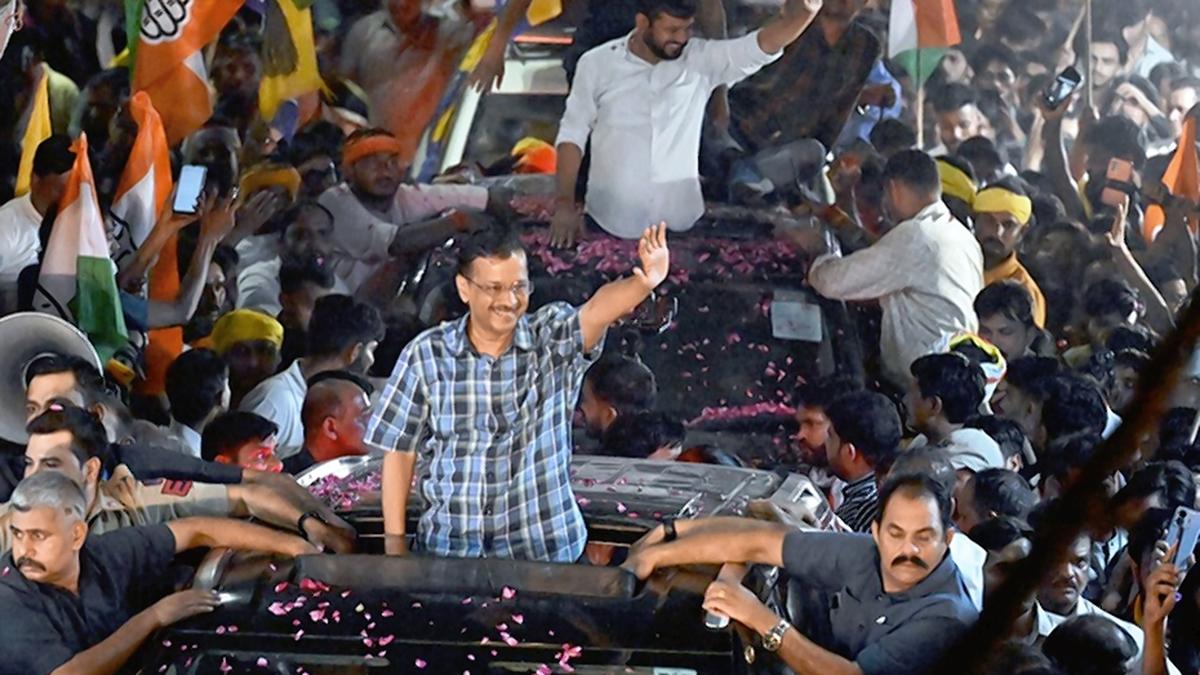
During election time, expect the unexpected Premium
The Hindu
Covering the Lok Sabha elections for the first time can be equally thrilling and daunting
For a cub reporter who is just finding her feet in the industry, covering any election can be intimidating, and a Lok Sabha one even more so. During election season, there is a constant influx of information and misinformation. There are dozens of speeches to cover, interviews to conduct, and places to be at. Some of these assignments can throw up surprises and involve quick turnarounds. All reporters prepare meticulously before elections, but regardless of the effort, something or the other tends to happen which changes the course of our coverage. In short, we always have to be prepared for the unexpected too.
For instance, just ahead of the polls, Delhi Chief Minister Arvind Kejriwal was arrested. This was an unprecedented event that none of us foresaw. On the day of the arrest, I was having a slow news day. But as updates of the Enforcement Directorate reaching the Chief Minister’s residence came in, I rushed to the site with my colleagues and saw him being taken away. The arrest landed the Aam Aadmi Party in a crisis and changed its campaign, likely made a difference to public opinion, and affected our coverage of the elections in the capital too.
There were also days when I found myself unprepared to deal with the contradictions in narratives or unable to trace the source of a narrative or belief. In north-east Delhi, for instance, where riots broke out in early 2020 over the Citizenship (Amendment) Act, 2019, several people I spoke to recounted a particular narrative against the Congress’s candidate, Kanhaiya Kumar. People dismissed him as the leader of the “tukde tukde gang” — a pejorative catchphrase used to refer to groups allegedly supporting sedition and secessionism — but when asked where they had heard this, many of them did not have a proper answer.
Similarly, while researching and writing about the candidates in the fray, I realised that it was difficult to take a call on which aspects about them were important, which ones were unimportant and avoidable, and which ones were perhaps unimportant but still interesting.
Additionally, we reporters must also deal with the fact that there are certain aspects or events in a person’s life that cannot be written about due to several factors. For instance, the candidate may have faced a case years ago. But if that case was withdrawn later, do you include it? Similarly, it can be tricky to write about personal details that shaped the candidate’s motivations.
One day, despite doing my research and discovering crucial details about the candidates buried in larger stories, I was still caught off guard. During an interview, I asked the candidate many personal questions, including what he does when he takes breaks from campaigning. When I asked him about his children, he paused, unable to speak. I did not realise that he had lost his child. A member of his team answered instead. I quickly changed the subject and we moved back to talking about politics.
Most importantly, I was unaware of the impact of some of these stories on readers. Journalists spend their lives chasing stories, with little time to really look back at the previous day or report. We file so many stories that we even forget about them sometimes. But readers don’t forget. Stories, I have come to know, can even change their mind about a particular issue or person. I learned this one day when a reader called me and said, “The profiles you are writing for the candidates in my constituency will decide who I vote for.”

“Writing, in general, is a very solitary process,” says Yauvanika Chopra, Associate Director at The New India Foundation (NIF), which, earlier this year, announced the 12th edition of its NIF Book Fellowships for research and scholarship about Indian history after Independence. While authors, in general, are built for it, it can still get very lonely, says Chopra, pointing out that the fellowship’s community support is as valuable as the monetary benefits it offers. “There is a solid community of NIF fellows, trustees, language experts, jury members, all of whom are incredibly competent,” she says. “They really help make authors feel supported from manuscript to publication, so you never feel like you’re struggling through isolation.”

Several principals of government and private schools in Delhi on Tuesday said the Directorate of Education (DoE) circular from a day earlier, directing schools to conduct classes in ‘hybrid’ mode, had caused confusion regarding day-to-day operations as they did not know how many students would return to school from Wednesday and how would teachers instruct in two modes — online and in person — at once. The DoE circular on Monday had also stated that the option to “exercise online mode of education, wherever available, shall vest with the students and their guardians”. Several schoolteachers also expressed confusion regarding the DoE order. A government schoolteacher said he was unsure of how to cope with the resumption of physical classes, given that the order directing government offices to ensure that 50% of the employees work from home is still in place. On Monday, the Commission for Air Quality Management in the National Capital Region and Adjoining Areas (CAQM) had, on the orders of the Supreme Court, directed schools in Delhi-NCR to shift classes to the hybrid mode, following which the DoE had issued the circular. The court had urged the Centre’s pollution watchdog to consider restarting physical classes due to many students missing out on the mid-day meals and lacking the necessary means to attend classes online. The CAQM had, on November 20, asked schools in Delhi-NCR to shift to the online mode of teaching.









